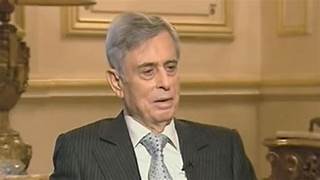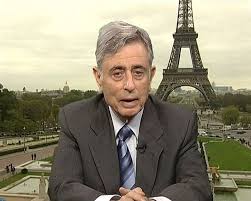“I can’t imagine how the war in Syria will end… I believe that the US administration is no longer capable, perhaps, of fixing the situation there,” these were the words of former Syrian Vice President Abdul Halim Khaddam as he expressed his vision for the outcome of events in his homeland.
From his Parisian home thousands of kilometers away from his home country, the 84-year-old Syrian politician discussed various topics in a phone call with the American magazine “Newsweek Middle East.” He touched upon the Iranian intervention in Syria, the failed coup in Turkey, the US presidential elections, the “Syrian chemical arsenal,” and the recent US targeting of Syrian army forces in Deir ez-Zor instead of terrorist groups. He emphasized that he has no intention of playing a political role in the “post-Assad” phase but dreams of returning to his homeland.
In his conversation, Khaddam described the war that has been ongoing in his country since 2011 as a global conflict, pointing out that the international community and Arab countries missed several opportunities to assist the revolution, which failed to achieve its main goal of “toppling President Bashar al-Assad’s regime within weeks or a few months.” In this context, he blamed the Russian-American rivalry and global disputes over the use of force in the country for fueling the conflict, considering Washington’s treatment of the opposition as “incomprehensible,” after it betrayed them and refused to provide military assistance while allowing Russia to undermine Syria’s stability.
Regarding US-Turkish relations, Khaddam believed that Washington also betrayed its ally in the region. It contributed to the failed coup on July 15th of last year and armed the Kurds against Turkey. He pointed out that Moscow has mended its relations with Ankara and provided information regarding this matter just a few days ago, after the relationship between them deteriorated following the downing of the Sukhoi aircraft last November.
With the United Nations attributing responsibility for two chemical attacks to Syrian authorities, one in 2017 and another in 2016, Khaddam denied knowledge of his country’s chemical arsenal in its entirety, both generally and in detail. He emphasized that this issue falls within the domain of intelligence agencies and the army. Speaking about the initial events, he stated that these circumstances allowed Assad to kill with other weapons, criticizing the acceptance by some US officials of the idea of him staying in power for a second term.
Regarding US intervention in Syria, Khaddam described the US targeting of Syrian army positions in Deir ez-Zor as “mysterious” and justified it by saying they had knowledge of both “the regime” and terrorist groups’ locations. Politically, he confirmed that former US President Barack Obama had disappointed him after coming to power, especially after reconciling with Iran despite its “interference in Syria, Iraq, Lebanon, and Yemen.” He expressed hope for the arrival of Democratic Party candidate Hillary Clinton after him.
Regarding ISIS, Khaddam believed that several factors contributed to its emergence and expansion into Syria. He pointed out that Iran “nurtured the organization” as part of its efforts to “establish a Sunni force to combat Sunnis in the region.” In this context, he emphasized the significant difference between the elder Assad and his son in their relationship with Iran. While the latter allowed Tehran, which now considers itself the guardian of Damascus, to intervene in Syrian affairs through the Iranian Revolutionary Guard and Hezbollah, the elder Assad was feared by Tehran, and they hesitated to interfere with him.
In this context, Khaddam linked the presence of Hezbollah to the presence of “the regime” in Syria, claiming that the latter “would not be able to stand on its own if the lifeline of Iran, which supplies it with money in Syria, were cut off.” He stated that “Hezbollah is worth nothing without the current Syrian regime.”
In conclusion, Khaddam asserted that the Syrian crisis would not reach its conclusion until all players came together around one table. This would require convening an international conference to rescue Syria, with the participation of all global powers from the West to the East, including Iran. He supported the liberation of Syria and the formation of an international armed force to disarm all factions.
On the other hand, he rejected any political solution, warning of the possibility of “the regime or its figures remaining in power under such a solution, which would lead to new conflicts in the future that could extend to include other regions of the world.” He denied seeking any political position in Syria in the “post-Assad” era, describing his role as national.




